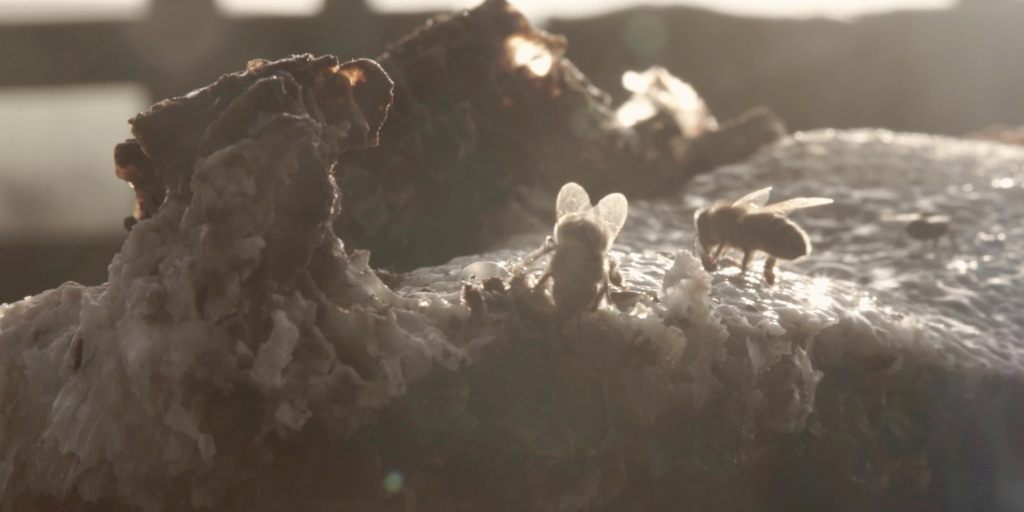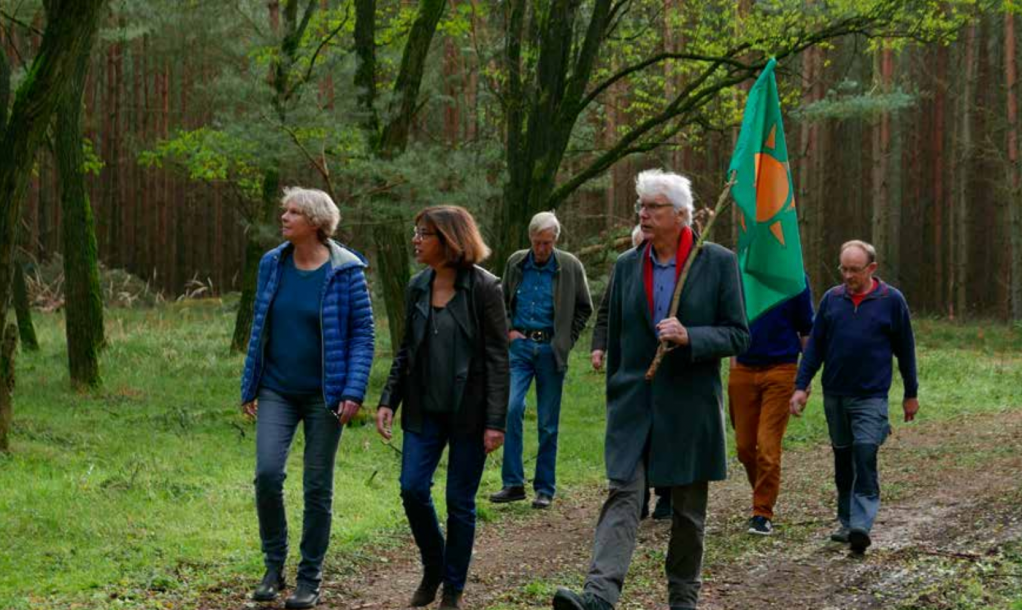
Two films tell contrasting stories about the struggle against nuclear power
Event Date: 30th March 2021
Location: Internet 17:00 GMT

Two films tell contrasting stories about the struggle against nuclear power
By Linda Pentz Gunter
Note: Beyond Nuclear, Goethe-Institut, DC and Heinrich Böll Stiftung, DC are making The Beekeeper and 33 Days of Utopia available free to screen at home until April 6. On Tuesday, March 30, at 1pm Eastern US time, please join us, the filmmakers and protagonists for a live discussion about the films and the culture of resistance to nuclear power. Register here.
“And at that point,” says Katie Hayward, halfway through Will McGregor’s short film, The Beekeeper, “I went cold”.
Hayward, the beekeeper of the film’s title, had just seen a news report showing the expanded footprint of the proposed two-reactor Wylfa B nuclear power project on the island of Anglesey in North Wales. Hayward’s home, which her family had tenanted since 1532, was right in the plan’s crosshairs. It would be bulldozed, and the farmland paved over.
Hayward’s fight to save her bees, her home and her rescue animals escalated, while her physical and mental health plummeted. As the farms around her sold out to Horizon — the nuclear subsidiary of site owner, Hitachi — Hayward found herself almost alone, a one-woman David against a corporate Goliath.
 Katie Hayward had adapted to farming in the shadow of the decommissioned Wylfa A reactor. But new nuclear construction threatened to destroy everything she cared about. (Photo courtesy of Will McGregor)
Katie Hayward had adapted to farming in the shadow of the decommissioned Wylfa A reactor. But new nuclear construction threatened to destroy everything she cared about. (Photo courtesy of Will McGregor)Neighbors shunned and even harassed her for her obstinate stance against the nuclear plant. But with not only her hives but a plethora of rescue animals, there was nowhere else to go. Hayward had to be able to look after her bees, she says in the film, “because these little creatures that are so important to our planet, they actually need us to help them live at the moment.” And we, as it turns out, also need them.
After Hayward had an unexpected “massive stroke” at just 35, she quit her management job at a major construction firm and focused her attention on her bees. Noticing that her relationship with them was “very Zen and it takes you into a completely different world,” she realized that “if my bees have helped me, maybe they can help others.” Her honey-producing company, Felin Honeybees, expanded to include “bee therapy,” helping women escaping domestic violence, people suffering from PTSD, and young people who were self-harming.
But the darker side to her story is missing from The Beekeeper. After McGregor, with a successful string of film and television programs behind him, approached Hayward, the two embarked on a searingly powerful short film about Hayward’s bitter battles with Horizon.
And then Horizon’s lawyers stepped in.
The often tearful video diaries Hayward had recorded were mostly cut from the final film. A disclaimer at the end about the alleged “low-carbon” footprint and jobs capacity of nuclear power was obligingly tacked on. It was probably not the final product that either Hayward or McGregor had anticipated. But powerful, none the less.
The film ends with Hayward lamenting that she has lost her fight — “We were the first family to live here and we’re going to be the last”. But that’s not in fact how the story ended.
Hitachi announced last September it was pulling the plug on the Wylfa B and in January 2021 Horizon withdrew its planning application, signaling the definitive end of the project. Shortly afterwards, the UK Planning Inspectorate announced it would have recommended the nuclear project be rejected. Horizon has laid off most of its staff and is shutting up shop. Despite rumors of American interest from Bechtel/Westinghouse/Souther Company, no other offers for Wylfa B were ever made. If anything nuclear ever happens at the site it is more likely to be an attempt to site a small modular reactor there. But, as we know, this remains a financial pipe dream spurred on, in the UK at least, only by the interests of further bolstering its nuclear weapons sector.
So the “Queen Bee of Anglesey,” as Hayward is known, reigns on.
 Hayward’s bees and her farm survived the threat of a new nuclear power plant. (Photo courtesy of Will McGregor)
Hayward’s bees and her farm survived the threat of a new nuclear power plant. (Photo courtesy of Will McGregor)By contrast, the bulldozers roll in with a vengeance in the 84-minute documentary, 33 Days of Utopia, as they clear a 1980 encampment —The Free Republic of Wendland— established by 800 idealists and maintained for the titular 33 days to prevent the construction of a high-level radioactive waste site at Gorleben, in Lower Saxony, Germany.
 Former protesters, along with their official Free Republic of Wendland flag, returned to the now overgrown site of their 1980 anti-nuclear encampment, along with a filmmaker and an archeologist. (Photo courtesy of Roswitha Ziegler)
Former protesters, along with their official Free Republic of Wendland flag, returned to the now overgrown site of their 1980 anti-nuclear encampment, along with a filmmaker and an archeologist. (Photo courtesy of Roswitha Ziegler)This is a story not of solitary opposition, of fear and loneliness, but mass solidarity, community and joy. The film opens with a wooden boat suspended on high. We hear flutes playing. Later we see balloons, communal kitchens, musicians gathered in song. There are wooden cottages and tepees and yurts. It may be an anti-nuclear action but it is fundamentally about something else — a new way of living; a different kind of society, “a glimpse of something that might be in the future.”
A whole village — known as 1004, the designated name of the waste dump site — rose up. And 33 days later it disappeared. As Rebecca Harms, a young woman in the film who went on to be a Green Member of the European Parliament, says, they destroyed absolutely everything.
But not quite. Enter eager young archeologist, Attila Dézsi, a graduate student at the University of Hamburg, who decides, in 2018, that the archeology of protest would make an interesting dig. Accompanied by filmmaker, Roswitha Ziegler, who was one of the 1980 protesters, along with other occupiers including Harms, Dézsi, sets about to unearth the relics of the occupation.
“It’s odd to be digging up something after 40 years, in my lifetime,” observes Harms. And indeed, the objects Dézsi finds are relatively banal. Not exactly Pompeii, as someone observes.
 It was not exactly Pompeii, but archeologist Attila Dézsi’s findings at the old encampment site yielded plenty of stories. (Photo courtesy of Roswitha Ziegler)
It was not exactly Pompeii, but archeologist Attila Dézsi’s findings at the old encampment site yielded plenty of stories. (Photo courtesy of Roswitha Ziegler)But in unearthing bent spoons, flattened cooking pans, scores of cups and other detritus, new life is somehow given to the memories and the shared dreams of that time.
A found cup, for Dézsi, becomes “the silent witness to the last moment.” But without his coterie of eye-witnesses, the feelings and the memories are lost.
The Utopia that was created at 1004 was an attempt to explore a new way of living, centered around affinity groups, with “spokes,” who as one who served in that capacity describes it, meant “thirty-three days of tensions” while others reveled in the apparent Utopian harmony of communal living.
There is a flag and a radio station and even an “official” Republic of Wendland passport. And, as in The Beekeeper, there is almost no mention of the nuclear issue at hand. For sure, the 800 head to the site because they oppose the nuclear waste dump. But when they get there, something else starts to happen, “the dream of everything” as they call it, quoting Karl Marx.
At the end of the film, we see the police lines and the bulldozers, the tear gas and the batons. And in 2018, when Ziegler and her film crew return with Dézsi, we see pine forests and undergrowth. The site is unrecognizable.
It is unrecognizable because, even though the bulldozers came to Gorleben but not to Anglesey, the German project, like the Welsh one, simply fell apart. There is no high-level radioactive waste dump at Gorleben, and there never will be. The German government says a new site will be presented in 2031. But for now all they have is a “white map.” A blank. They are starting from scratch.
 33 Days of Utopia also travels to the anti-nuclear waste dump occupation at the Bure site in France. The banner reads: “Gorleben Bure, the same struggle. There is no such thing as a safe repository”. (Photo courtesy of Roswitha Ziegler)
33 Days of Utopia also travels to the anti-nuclear waste dump occupation at the Bure site in France. The banner reads: “Gorleben Bure, the same struggle. There is no such thing as a safe repository”. (Photo courtesy of Roswitha Ziegler)The two films show not only the destructive force but also the futile folly of nuclear power projects. Farms were abandoned and houses razed on Anglesey. Wildlife was disrupted. Gorleben saw years of protests and upheaval. And in the end. Nothing.
Germany, at least, learned one lesson. The last of its nuclear power plants will be closed next year. Despite its detractors, it is on target to achieve its 80-100% renewable energy goals.
The UK government, meanwhile, clings on to the nuclear illusion, even as new nuclear plant projects at Sizewell and Bradwell continue to falter.
The lives of the Gorleben protesters were, for some, changed forever. “I decided I had something to say,” says Harms looking back at that moment and the new direction her life took, into public office.
Hayward’s life, meanwhile, can remain mercifully unchanged.
But either way, whatever nuclear threat we face now, and in the future, we need the Katie Haywards, and we need the Utopians.
Headline photo of the Hayward farm courtesy of Will McGregor.
Register here for the March 30 event in conversation with the films’ directors and protagonists. Please note that if you live in a German- or French-speaking country in Europe, you will not be able to access the link to 33 Days of Utopia as the film will be released by Arte later this year.